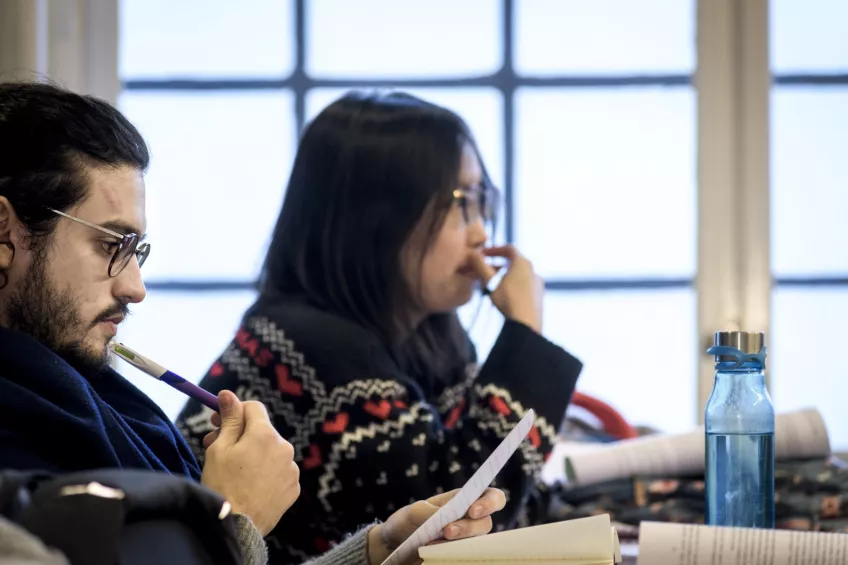Master's programme in International Human Rights Law
Lund University’s LL.M. in International Human Rights Law is one of the most prestigious and oldest graduate degrees in human rights law. Ranked among the top-10 human rights law programmes worldwide, the two-year degree attracts a diverse group of international students and offers a broad curriculum taught by leading international law and human rights experts.
Rich in Tradition, Unrivalled Reputation
Since its establishment more than 25 years ago, the LL.M. programme has been a joint venture of Lund University’s Faculty of Law and the independent Raoul Wallenberg Institute of Human Rights and International Humanitarian Law (RWI). Due to this unique collaboration, the programme offers students the possibility to combine rigorous academic study of international human rights law with an in-depth exposure to questions that arise when working with human rights in practice. At the RWI, our LL.M. students have exclusive access to the largest human rights library in Northern Europe, dedicated entirely to supporting their academic and research needs.
Expert Faculty
Our faculty consists not only of leading academics who shape the international human rights discourse but also includes current and former UN special rapporteurs, current and former members of the UN’s International Law Commission, leaders of national and international civil society organisations, members of government agencies and relief organisations who work with international human rights norms on a daily basis. Every year, the LL.M. programme, together with the RWI, also hosts a visiting professor from the US thanks to generous support from the Fulbright Commission in Sweden. Previous academic visitors and guest lecturers have included UN secretary general Kofi Annan, Nobel prize laureate and human rights lawyer Shirin Ebadi, president of the UN General Assembly Jan Eliasson, UN special rapporteurs David Kaye (Freedom of Expression) and Richard Bennet (Afghanistan), International Law Commissioner Charles C. Jalloh.
International Student Body
Our students come from all over the world. While some progress to the LL.M. directly from their undergraduate studies, many possess considerable previous experience of working with international law and human rights law as judges, state attorneys, lawyers or members of civil society organisations. The LL.M. programme also offers a unique mentoring scheme that pairs current LL.M. students with programme graduates who work in their field of interest to help current students navigate the broad and diverse field of international human rights careers.
Global Network of Graduates
The careers chosen by our graduates upon graduation are as diverse as their backgrounds. Many of our LL.M. graduates work at the various headquarters of the UN, for regional organisations, for national governments, as judges at international and domestic courts, for international and national non-governmental organisations, as independent lawyers or in-house counsel in the private sector. A considerable number of our graduates also opt to pursue doctoral studies in related fields at top universities around the world.
Comprehensive Curriculum
The LL.M. programme is divided into four terms. The first two terms focus on compulsory modules on public international law and international law’s various human rights law regimes. Subsequently, students can specialise by studying various optional courses of their choice. Current optional courses included modules on international criminal law, environmental law, migration law, business and human rights, among others. The degree’s final term is dedicated to the writing of a master thesis. Many students combine their studies with intern- or externships hosted by national and international organisations situated in the Öresund-region (Lund, Malmö, Copenhagen).
Contact
Anders Tröjer
Master's Programme Coordinator
anders [dot] trojer [at] jur [dot] lu [dot] se (anders[dot]trojer[at]jur[dot]lu[dot]se)
+46 46 222 12 49
Facts about the programme
Length: Two years
Credits: 120 credits
Campus: Lund
Degree: Master of Laws (LL.M.) in International Human Rights Law
Tuition fee: 155.000 SEK per study year (for non-EU/EEA students)
Scholarships
On Lund University's website, you can find information about scholarships that cover both tuition fees and living expenses. Note that you can apply for several scholarships when you have applied to a master's programme. You don't have to be admitted to a master's programme to apply!
Times Higher Education
Times Higher Education is one of the three leading international rankings of universities.
A recent Time Higher Education (THE) ranking has positioned the law field at Lund University in 2024 at the 1st place in Sweden, at the 1st place in the Nordic region, at the 7th place in the European Union and at the 38th place worldwide
The Raoul Wallenberg Institute
The Raoul Wallenberg Institute (RWI) is an independent academic actor for the promotion of human rights and humanitarian law by means of research, academic education and institutional development. The Institute was founded in Lund in 1984 and possesses a unique combination of theoretical knowledge and practical experience in its fields of activity. Besides traditional academic activities, the Institute implements extensive capacity development programmes internationally for the promotion of human rights standards, democratic values and the rule of law. From 1990 until today, these programmes have had the goal to support key institutions and functions that can effectively influence the domestic implementation of human rights.
You can read more about the Raoul Wallenberg Institute at their website.
